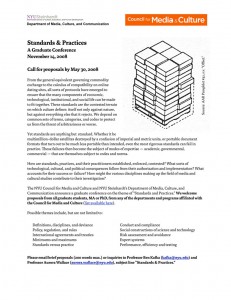 Standards & Practices
Standards & Practices
A Graduate Conference
November 14, 2008Call for proposals by May 30, 2008
From the general equivalent governing commodity exchange to the calculus of compatibility on online dating sites, all sorts of protocols have emerged to ensure that the many components of economic, technological, institutional, and social life can be made to fit together. These standards are the contested terrain on which culture defines itself not only against nature, but against everything else that it rejects. We depend on common sets of terms, categories, and codes to protect us from the threat of arbitrariness or worse.
Yet standards are anything but standard. Whether it be multimillion-dollar satellites destroyed by a confusion of imperial and metric units, or portable document formats that turn out to be much less portable than intended, even the most rigorous standards can fail in practice. These failures then become the subject of modes of expertise — academic, governmental, commercial — that are themselves subject to codes and norms.
How are standards, practices, and their practitioners established, enforced, contested? What sorts of technological, cultural, and political consequences follow from their authorization and implementation? What accounts for their success or failure? How might the various disciplines making up the field of media and cultural studies contribute to their investigation?
